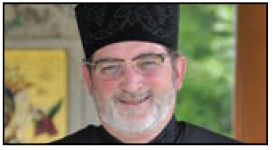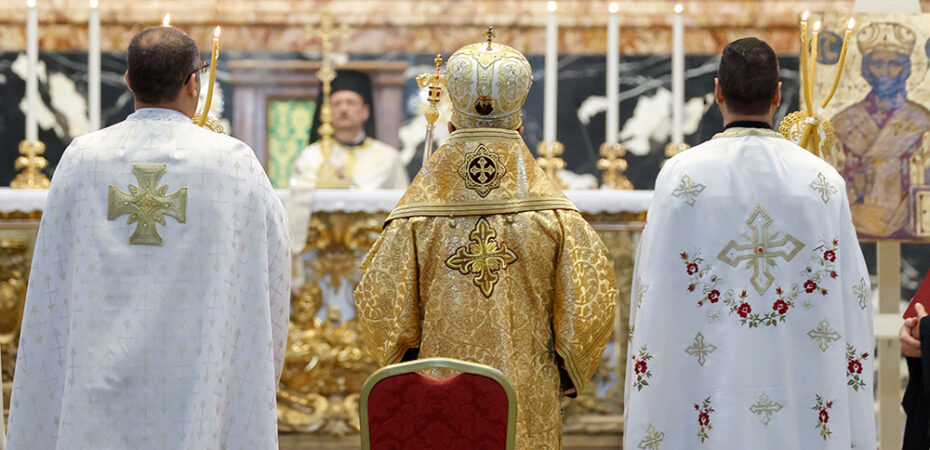‘It Is Time for the Lord to Act!’
Announcing the kairos of the Lord’s blessing
Father Daniel Dozier Comments Off on ‘It Is Time for the Lord to Act!’
 Just before the blessing of the deacon to leave the sanctuary and go out before the Royal Doors at the beginning of the Byzantine Divine Liturgy, the deacon begins prayers of dialogue with the priest by saying: “It is time for the Lord to act. Reverend Father, give the blessing.”
Just before the blessing of the deacon to leave the sanctuary and go out before the Royal Doors at the beginning of the Byzantine Divine Liturgy, the deacon begins prayers of dialogue with the priest by saying: “It is time for the Lord to act. Reverend Father, give the blessing.”
The priest, in response, says, “Blessed is our God, always, now and ever and forever. Amen.”
These prayers are taken in front of the Holy Table behind the closed Royal Doors, and so are out of either the view or earshot of the faithful. For those who have served and either heard or spoken these prayers, it is a powerful and memorable dialogue, even if its meaning might seem initially obscure. I would argue that this dialogue encapsulates the meaning of the ministry of the diaconate. To see this, we need to look at the words that are used.
The phrase “It is time for the LORD to act” comes from Psalm 119:126. To understand the meaning of this verse, it is helpful to read it in context: “I have fulfilled your righteous judgment; / do not abandon me to my oppressors … / My eyes long to see your salvation / and the promise of your righteousness … / I am your servant; give me discernment / that I may know your testimonies. / It is time for the LORD to act; / they have disobeyed your law” (vv. 121-126).
Psalm 119 (LXX Psalm 118) is a psalm that exalts in the greatness and glory of God’s Torah (law or instruction) in Israel. Coming just before the Psalms of Ascent that were sung by worshipers ascending the stairs leading into the Temple, it declares the Law of the Lord to be a gift to Israel that revives the soul (cf. v. 27), a sure guide to salvation (v. 81), the joy of the heart of those who love God (v. 111), a source of hope (v. 114) and true liberty (v. 45), fixed as God’s word in the heavens (v. 89), and loved and meditated upon throughout the day (v. 97). The faithful servant of the Lord, then, is the one who seeks to live, love, and delight in the Law of the Lord.
The phrase “It is time for the LORD to act” is the first part of the phrase spoken by the faithful servant in the psalm and is followed by, “They have disobeyed your law.” An alternative translation is, “For your law has been broken.” What is noteworthy here are three things.
First, what precipitates the statement regarding the Lord acting is the violation of the Law that is to be loved and treasured by Israel. This is not simply a call for God to take punitive action against the unrighteous, but to act for the redemption or deliverance of the righteous servants from the oppressors mentioned a few verses earlier. In other words, it is a call for the Lord to save faithful Israel that treasures the Law of God.
Second, the reference to “time” in the Greek Septuagint is not the word chronos, as in chronological or created time, but rather kairos, which means “eternity,” or God’s time — the time of salvation. Here we may recall the words of Jesus: “This is the time (kairos) of fulfillment. The kingdom of God is at hand. Repent, and believe in the gospel” (Mk 1:15); or that of St. Paul in 2 Corinthians 6:2: “Behold, now is a very acceptable time (kairos); now is the day of salvation.” In other words, the time for the Lord to act is the kingdom of God, which will be announced a few moments later.
Third, it is not the servants who are to take action to redeem Israel; rather it is the Lord himself. The Lord, in his glory, is coming now to redeem Israel. Those who are his servants are the instruments to declare this redemptive blessing for his people.
Returning to this moment of dialogue before the Holy Table, both priest and deacon have kissed the Holy Table representing the throne of the Lord (this was an ancient custom observed when coming before the king). The Lord is “seated” on this throne in his holy Gospel — the New Law of the Lord for the nations, which is venerated solely by the priest. Immediately after the phrase “It is time for the LORD to act,” the deacon petitions for the gift of the blessing for the Church. The Hebrew word for blessing is berakah. The berakah is one of the central elements of Jewish liturgy and life since it offers wonder, praise, gratitude and blessing to God, who is the source of all life and goodness. The blessing acknowledges and effectuates his reign over all things.
The faithful servant — the deacon — at this time (kairos) in fulfillment of his ministry calls on behalf of the people for the inauguration of the redemptive Kingdom through a priestly blessing before the Lord enthroned in glory. He is thus the servant of the priestly berakah through which the Lord acts to save his people.
FATHER DANIEL DOZIER is co-founder and chief learning officer for The Center for InMinistry Development and an associate professor of Scripture and Catholic leadership, www.inministrydevelopment.com.





